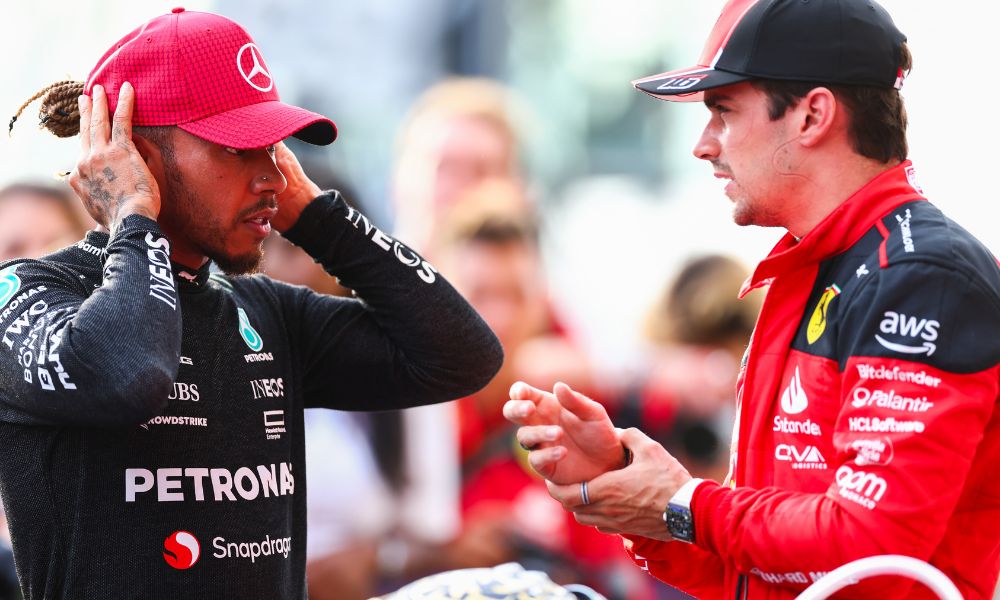- Move will likely see ticket prices and sponsorship premiums increase across F1
- Addition of Hamilton further backs up “why a brand should want to be involved” with Ferrari
Lewis Hamilton’s move to Ferrari is a “perfect match” for the pair, according to Formula One’s former head of global sponsorship and commercial partnerships.
Last week, Hamilton shocked the Formula One world by announcing he would join the Italian outfit for the start of the 2025 season.
The Brit has been backed by Mercedes since he was 13 years old and the seven-time world champion has only driven Mercedes-powered cars during his record-breaking stint in Formula One.
The move is fuelled by the belief that Ferrari can deliver an eighth world title for the 39-year-old, but there are set to be far-reaching commercial ramifications.
“Putting the dominant brand [in Formula One] with the most successful racing driver currently on the grid – and, indeed, one of the greatest of all time – is a perfect match,” Murray Barnett, who was Formula One’s head of global sponsorship and commercial partnerships from 2017 to 2020, told BlackBook Motorsport.
“Ferrari generally commands amongst the highest prices on the grid from a sponsorship perspective, so this is certainly backing up why a brand should want to be involved with Scuderia Ferrari.”
- Alessandro Alunni Bravi on why replacing Alfa Romeo with Stake gives Sauber ‘a strong identity’
- The SkyPad, Martin Brundle interviews, and remote production: Inside Sky Sports’ award-winning F1 coverage
In addition to enhancing the exclusivity of the team, the move is likely to reinvigorate the wider sport. This will be even more important if 2024 proves to be another season of dominance for Red Bull and Max Verstappen.
“If there’s not enough moving around [between drivers] and not enough competition at the top, then I think it could have a negative impact on the overall level of interest in the sport,” Barnett added.
“Ticket prices for promoters will go up and the entry price for sponsors across the board will rise because people will see a knock-on effect on the overall level of excitement and interest [with Hamilton at Ferrari].”
The economic impact of Hamilton’s move has already been highlighted by Ferrari’s share price jumping more than ten per cent in the wake of the news, which equates to just under US$7 billion.
While the Ferrari team are clearly set to benefit from this move, Mercedes are losing both a fierce competitor on track and a commercial figurehead off it.
Monster Energy saw fit to jump ship from Mercedes to McLaren before the start of this season, but the energy drink brand still sponsors Lewis Hamilton despite this. The Brit also played a large role in encouraging Tommy Hilfiger to partner with Mercedes.
But, with the commercial health of Formula One at the moment, Mercedes will likely be able to adapt appropriately.
“Anything like this that’s a perceived loss, [Mercedes] will take very personally,” explained Barnett. “However, I think they have an amazing driver [in George Russell] and I think there is an opportunity for him to be elevated into the principal team driver.
“There is also a lot of potential for the team to add somebody that may not have quite as much commercial pull as Lewis [Hamilton], but certainly can mitigate against any downward pressure they might feel.”
This is helped by the fact that, ultimately, “the primary desire for sponsors is exposure in association with the particular marks and brands,” Murray continued.
So, while Hamilton leaving is certainly not ideal for Mercedes, it could end up being a good move for the team.
“Once the dust settles, [Mercedes] will take a look and take some positives out of this [as] the sport is in a very robust commercial position at the moment, and there’s opportunities for them to do different things with Lewis leaving,” said Barnett.
BlackBook Motorsport Forum is back for its 10th anniversary edition. Join us in London this April to navigate the transformation of motorsport and the trends driving the industry forward into the next decade.

